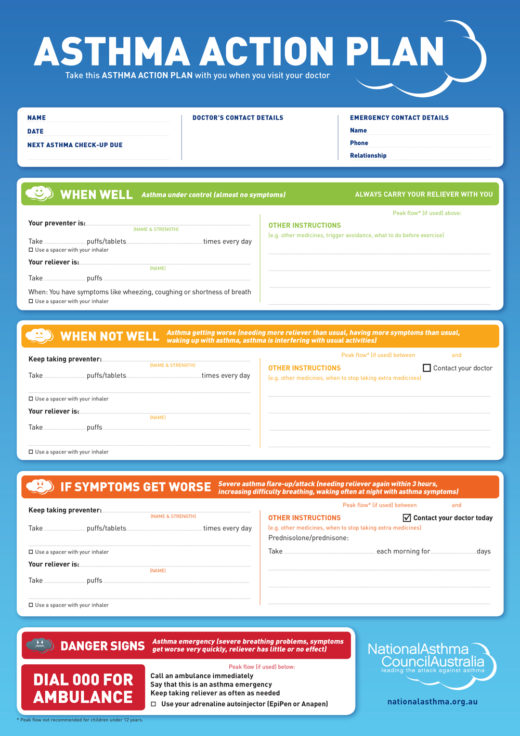Asthma in young children is one of the most common causes of hospital admission and visits to the doctor in this age group. Until the age of 5, asthma is not easy to diagnose. This is due to many reasons for wheezing and coughing at that age.
Once your Dr has decided asthma is the diagnosis, treatment is often a series of trials with different doses of medication. The aim of good asthma management is to ensure that children can lead a normal healthy life, while taking only as much medication as is needed to keep them well, and avoid asthma attacks.
As children sometimes spend periods of time away from home in school, childcare and at family or friends, it is important for those carers to be aware of your child’s asthma, recognise symptoms and what to do in an emergency. Parents can provide these carers with a copy of their child’s asthma action plan and asthma first aid information to help them be prepared.
What is Asthma
Asthma is a disease of the airways, the small tubes which carry air in and out of the lungs. When you have asthma symptoms, the muscles in the airways tighten and the lining of the airways swells and produces sticky mucus. These changes cause the airways to become narrow, so that there is less space for the air to flow into and out of your lungs.
- Coughing
- Tight feeling in the chest
- Wheezing – whistling noise when breathing
- Shortness of breath
- Struggling to breathe
These symptoms are often worse at night, in the early morning or during exercise.
Apart from the above symptoms, children may also
- Not eat or drink as much
- Cry
- Have tummy ache and vomiting
- Become tired quickly
- Get more puffed out than usual when running and playing
Asthma that is triggered by exercise may be helped by medication and/or warm up exercises.
Triggers of Asthma
As we know, all children are different and so can the triggers for asthma.
The most common triggers of asthma are:
- Allergy triggers, e.g. house dust mites, pollen, pets and moulds
- Cigarette smoke
- Viral infections, e.g. colds and flu
- Weather, e.g. cold air, change in temperature, thunderstorms
- Work-related triggers, e.g. wood dust, chemicals, metal salts
- Some medicines.
Asthma is a treatable health condition. Although at present there is no cure, with good management, people with asthma can lead normal, active lives.
If your child has wheezing, coughing or problems breathing, it is important to talk to your GP about asthma treatment and management.

